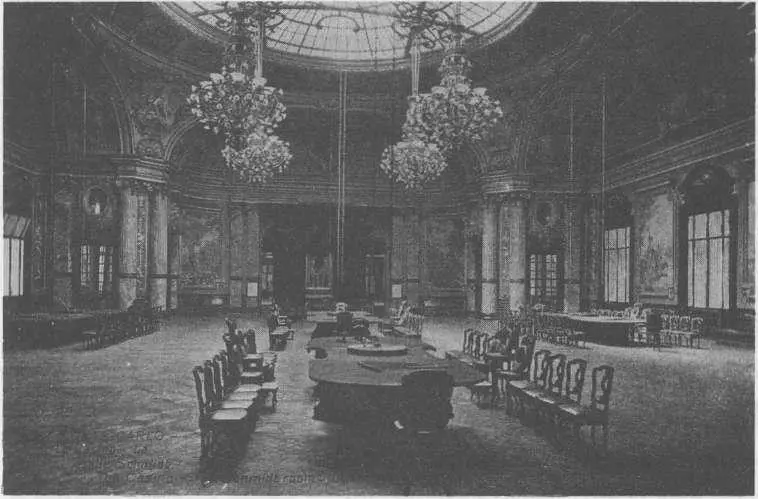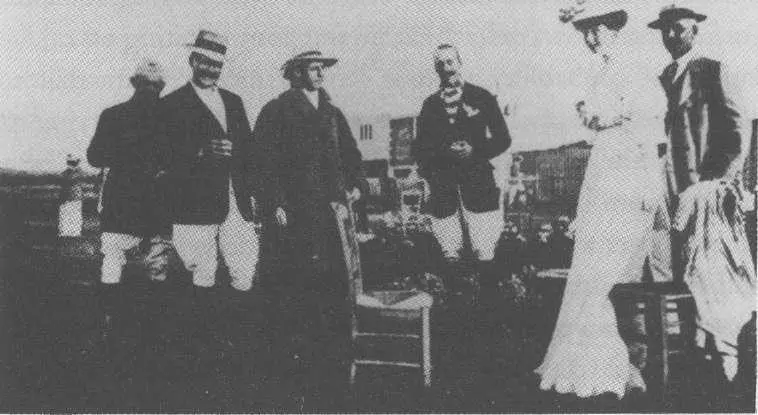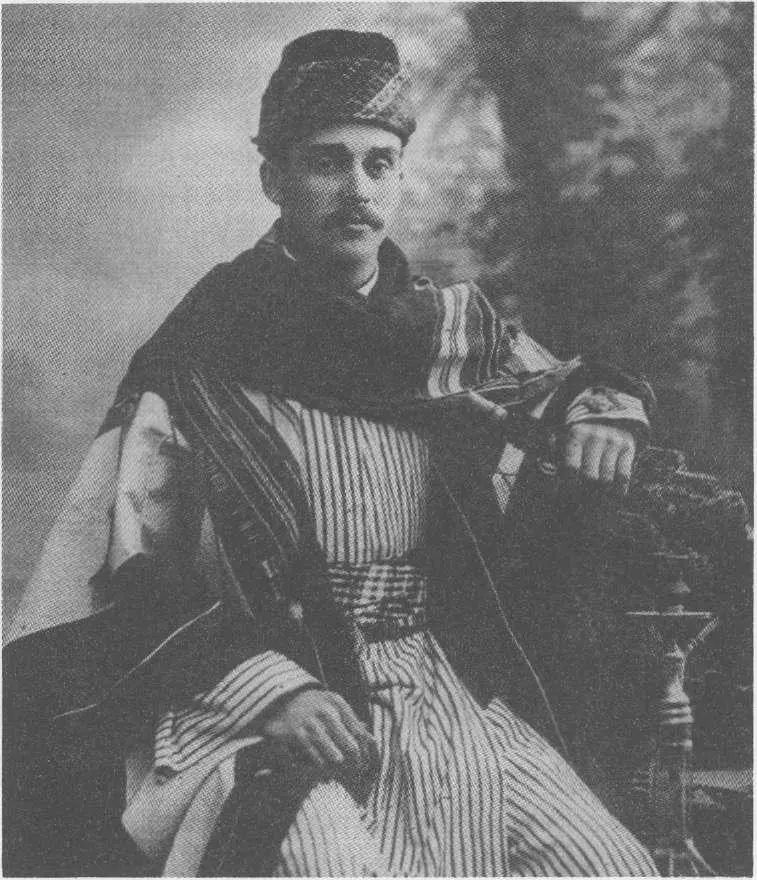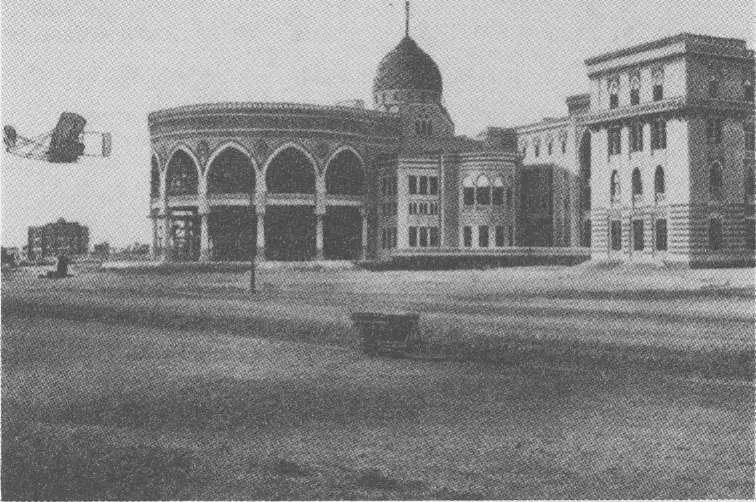
Schmidt. Uncle Adelwarth once told me that Cosmo would become strangely detached when he was playing roulette. At first, Ambros would think he was concentrating on calculations of probability, till one day Cosmo told him that at such times he actually was in a trance of some kind, trying to decipher the right number as it appeared for a fraction of a second from out of mists that were ordinarily impenetrable, whereupon, without the slightest hesitation, and as it were still in a dream, he would place his bet, either en plein or à cheval. Cosmo claimed that this condition of total withdrawal from normal life was dangerous, and it was the task of Ambros to watch over him as one would over a sleeping child. Of course I do not know what was really going on, said Aunt Fini, but one thing is certain: at Evian and Monte Carlo, the two of them made such a killing that Cosmo was able to buy an aeroplane from Deutsch de la Meurthe, the French industrialist. He flew it in the Quinzaine d'Aviation de la Baie de Seine at Deauville that August, and was by far the most daring of them all at looping the loop. Cosmo was in Deauville with Ambros in the summer of 1912 and 19x3 also, and caught the imagination of society, not just with his astounding luck at roulette and his daredevil acrobatics on the polo field but chiefly, I'm certain, by the fact that he turned down every invitation he received to tea, dinner or such like, and never went out or ate with anyone but Ambros, whom he always treated as an equal. Incidentally, said Aunt Fini, in Uncle Adelwarth's postcard album there is a picture that shows Cosmo with a trophy presented by an aristocratic lady — the Comtesse de Fitzjames, if I remember rightly — after a match at the Clairefontaine Hippodrome, probably a charity event. It is the only photograph of Cosmo Solomon

that I possess. There are relatively few photos of Ambros, too, probably because, like Cosmo, he was very shy, despite his familiarity with the ways of the world. In the summer of 1913, Aunt Fini continued, a new casino was opened at Deauville, and during the first few weeks people were seized by so frenetic a gambling fever that all the roulette and baccarat tables, and what they call the pet its chevaux , were constantly occupied by players, and besieged by more who wanted to play. One well-known joueuse called Marthe Hanau supposedly masterminded the hysteria. I remember clearly, said Aunt Fini, — that Uncle Adelwarth once called her a notorious filibustière, who had been a thorn in the flesh of the casino management for years but was now coaxing the gamblers to the tables on their behalf and at their behest. Apart from the machinations of Marthe Hanau, it was the overexcited atmosphere, which had been quite changed by the ostentatious luxury of the new casino, that was responsible for the unparalleled rise in the earnings of the Deauville Bank that summer of 1913, in Uncle Adelwarth's view. As for Cosmo, in the summer of 1913 he held even more aloof than in previous years from a social whirl that was growing ever headier, and would play only late in the evening, in the inner sanctum, the Salle de la Cuvette. Only gentlemen in dinner jackets were admitted to the privé, where the atmosphere that prevailed was always, as Uncle Adelwarth put it, most ominous — small wonder, said Aunt Fini, if you consider that whole fortunes, family properties, real estate and the achievements of lifetimes were not infrequently gambled away within hours. At the start of the season, Cosmo's luck was often changeable, but towards the end it would surpass even his own expectations. Eyes half closed, he would win time after time, pausing only when Ambros brought him a consommé or café au lait. Two evenings in a row, so Uncle Adelwarth told me, Cosmo cleaned out the bank and runners had to fetch more money, said Aunt Fini; and then on the third evening, when he broke the bank again, Cosmo won so much that Ambros was busy till dawn counting the money and packing it into a steamer trunk. After spending the summer in Deauville, Cosmo and Ambros travelled via Paris and Venice to Constantinople and Jerusalem. I cannot tell you anything of what happened on that journey, said Aunt Fini, because Uncle Adelwarth would never answer questions about it. But there is a photo of him in Arab

costume, taken when, they were in Jerusalem, and, said Aunt Fini, I have a kind of diary too, in tiny writing, that Ambros kept. For a long time I had quite forgotten about it, but, strange to say, I tried only recently to decipher it. With my poor eyes, though, I could not make out much more of it than the odd word; perhaps you should give it a try.
With long pauses, during which she often seemed very far away and lost, Aunt Fini told me, on my last day at Cedar Glen West, of the end of Cosmo Solomon and the later years of my Great-Uncle Ambros Adelwarth. Shortly after the two globetrotters returned from the Holy Land, as Aunt Fini put it, the war broke out in Europe. The more it raged, and the more we learnt of the extent of the devastation, the less Cosmo was able to regain a footing in the unchanged daily life of America. He became a stranger to his former friends, he abandoned his apartment in New York City, and even out on Long Island he soon withdrew entirely to his own quarters and at length to a secluded garden house known as the summer villa. Aunt Fini said that one of the Solomons' old gardeners once told her that in those days Cosmo would often be steeped in melancholy all day, and then at night would pace to and fro in the unheated summer villa, groaning softly. Wildly agitated, he would string out words that bore some relation to the fighting, and as he uttered these words of war he would apparently beat his forehead with his hand, as if he were vexed at his own incomprehension or were trying to learn what he said by heart. Frequently he would be so beside himself that he no longer even recognized Ambros. And yet he claimed that he could see clearly, in his own head, what was happening in Europe: the inferno, the dying, the rotting bodies lying in the sun in open fields. Once he even took to cudgelling the rats he saw running through the trenches. When the war ended, Cosmo's condition temporarily improved. He went back to designing flying machines, drew up a scheme for a tower house on the coast of Maine, took to playing the cello again, studied maps and ocean charts, and discussed with Ambros the various travels he planned. To the best of my knowledge, they made only one of these journeys, in the early summer of 1923, when the two of them went to Heliopolis. One or two pictures have survived from that visit to Egypt: one shows a kafeneion in Alexandria called the Paradeissos, one the San Stefano casino at Ramleh, and one the casino at Heliopolis. Their visit to Egypt seems to have
OASIS D HELIOPOLIS, CASINO

been made at rather short notice, said Aunt Fini, and from what Uncle Adelwarth told me it was an attempt to regain the past, an attempt that appears to have failed in every respect. The start of Cosmo's second serious nervous breakdown appears to have been connected with a German film about a gambler that was screened in New York at the time, which Cosmo described as a labyrinth devised to imprison him and drive him mad, with all its mirror reversals. He was particularly disturbed by an episode towards the end of the film in which a one-armed showman and hypnotist by the name of Sandor Weltmann induced a sort of collective hallucination in his audience. From the depths of the stage (as Cosmo repeatedly described it to Ambros) the mirage image of an oasis appeared. A caravan emerged onto the stage from a grove of palms, crossed the stage, went down into the auditorium, passed amongst the spectators, who were craning round in amazement, and vanished as mysteriously as it had appeared. The terrible thing was (Cosmo insisted) that he himself had somehow gone from the hall together with the caravan, and now could no longer tell where he was. One day, not long after, Aunt Fini continued, Cosmo really did disappear. I do not know where they searched for him, or for how long, but know that Ambros finally found him two or three days later on the top floor of the house, in one of the nursery rooms that had been locked for years. He was standing on a stool, his arms hanging down motionless, staring out at the sea where every now and then, very slowly, steamers passed by, bound for Boston or Halifax. When Ambros asked why he had gone up there, Cosmo said he had wanted to see how his brother was. But he never did have a brother, according to Uncle Adelwarth. Soon after, when Cosmo's condition had improved to some extent, Ambros accompanied him to Banff in the Canadian Rockies, for
Читать дальше
















